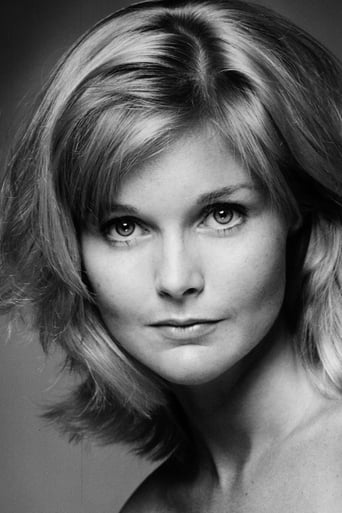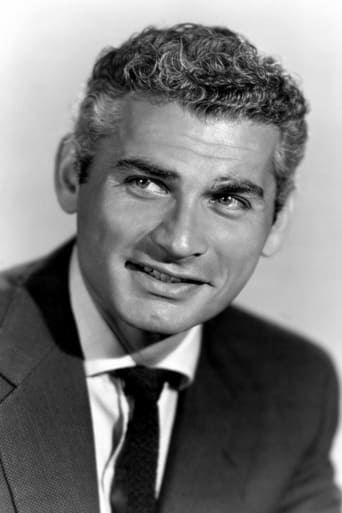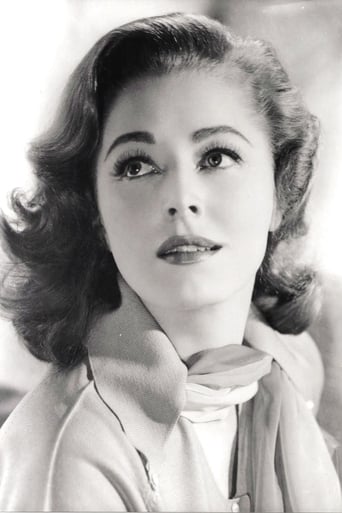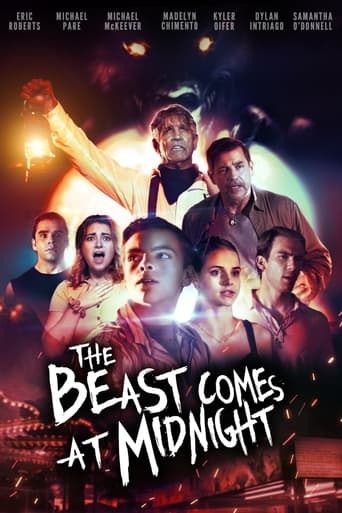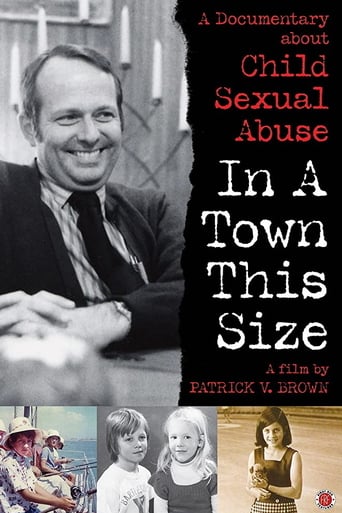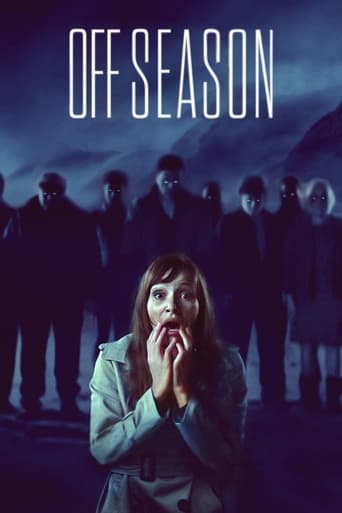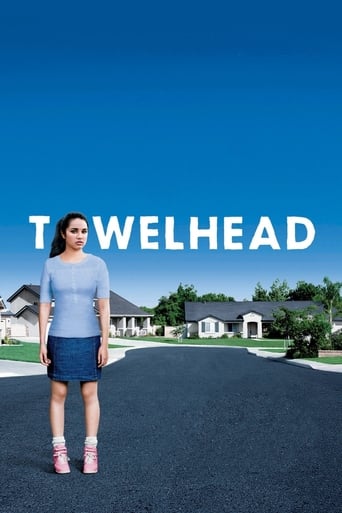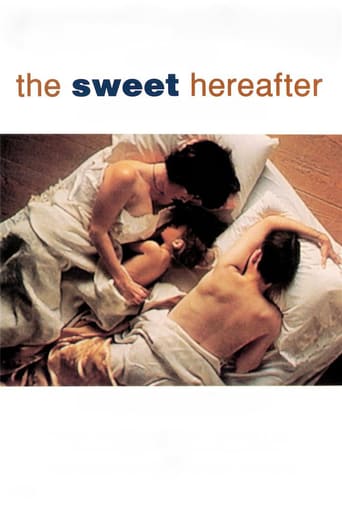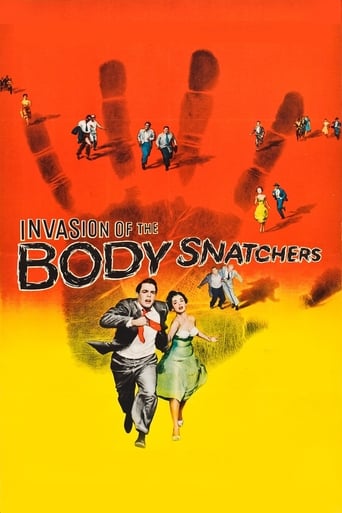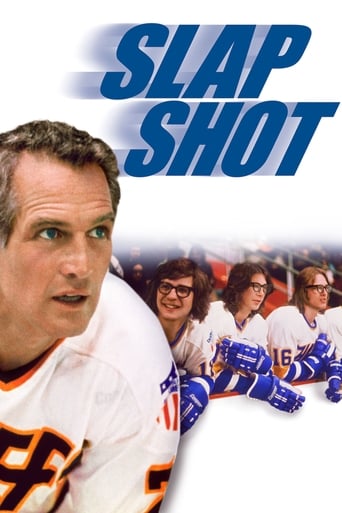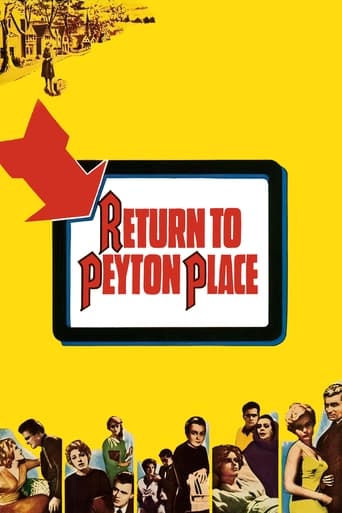
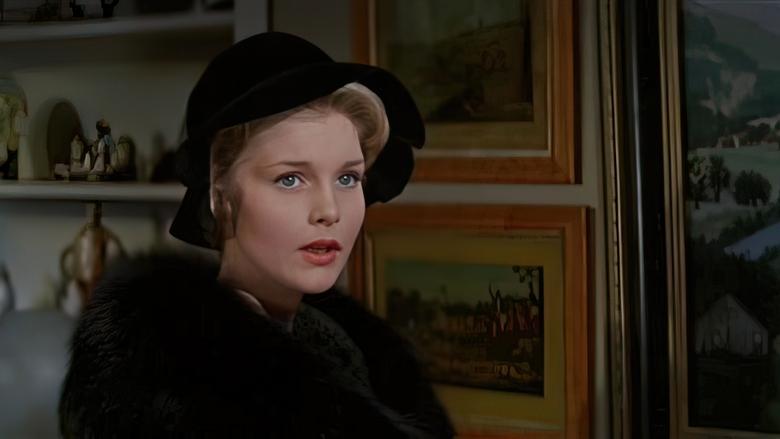
Return to Peyton Place (1961)
Residents of the small town of Peyton Place aren't pleased when they realize they're the characters in local writer Allison MacKenzie's controversial first novel. A sequel to the hit 1957 film.
Watch Trailer
Cast
Similar titles
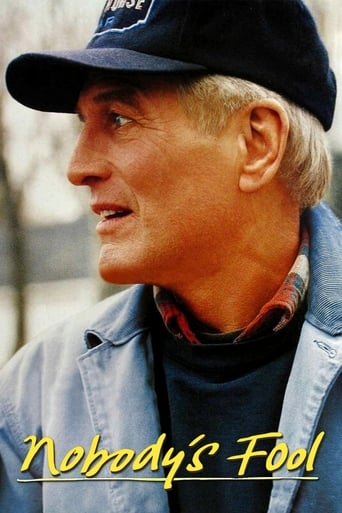
Reviews
You won't be disappointed!
This story has more twists and turns than a second-rate soap opera.
Exactly the movie you think it is, but not the movie you want it to be.
The film's masterful storytelling did its job. The message was clear. No need to overdo.
The much anticipated sequel to the 1957 box office sensation, somewhat rests in the middle of being a success and a failure. Most lamentably, none of the cast members of the original film reprises their roles, for whatever varying reasons, nor does the original director, Mark Robson. Miscasting and changes from the novel may account for some of the movie's awkwardness, but the quality of the performances and the last scene involving the town meeting which again, exposes the truth and the bigoted views of the townspeople, elevates it above other film sequels that suffered similar blows of comparison. Conversely, the fact that entirely different locations and sets are used, also gives the movie a sense of unfamiliarity - Mamouth, California for the ski lodge scenes, Fox's Malibu Ranch and backlots for the remainder of interiors and exteriors - the rest of the footage comes from the 1959 film "The Best Of Everything" (New York) and the first movie.Allison MacKenzie (Carol Lynley) publishes an autobiographical novel, Samuel's Castle, based on her hometown of Peyton Place and the people she knows. She becomes romantically involved with Lewis Jackman (Jeff Chandler), her married publisher. He encourages her to be as truthful as possible and never to be frightened of it. But that's not the only repercussion that her book incites - the locals are offended by the truths that Allison's tome reveals. Her mother Constance (Eleanor Parker) is both angry and fearful of both her daughter's expose and of history repeating itself, while her husband Mike Rossi (Robert Sterling) refuses to remove the book from the school library and as a result, his job as principal is put in jeopardy. It also touches Allison's friend Selena Cross (Tuesday Weld), as she begins a relationship with a ski instructor, Nils Larson (Gunnar Hellstrom), when reading aloud passages of the novel cause Selena to flashback to the night she killed her stepfather in self-defense. And Ted Carter's (Brett Halsey) marriage to the fiery Raffaela (Luciana Paluzzi) is on the rocks thanks to his meddlesome, evil mother Roberta (Mary Astor), whose bigoted view of her daughter-in-law and determination to keep her son in her clutches has tragic consequences. Conflict ensues as Allison achieves literary fame and Connie's need to control her daughter surfaces yet again, climaxing in a showdown during a town forum in which the truth is again told, much to the dismay of Roberta, who is also on a mission to keep up the facade of moralistic hypocrisy.Astor excels as the villainous matriarch, while Parker does a great job of taking on a role made famous by Lana Turner. Chandler is sufficient support but on occasion seems lost in the shuffle, while Lynley does a commendable turn as Allison, but she cannot eclipse the fine characterization of Diane Varsi. Halsey and Paluzzi were married at the time, which may or may not have factored into the casting, since Ted's wife in the novel was a woman from Boston named Jennifer rather than being an Italian model. Hellstrom, playing a role that was originally that of a summer stock actor, is a bit out of place (although quite humorous), and his jealousy of any man in Selena's life is alarming and distracting, while Sterling is respectable as Mike, who supports Allison and stands his ground. But by far the standout performance is that of Weld, who exceeds in touching the tormented past of Selena, never more so than in the scene where the past plays out in front of her, causing her to attack her boyfriend, and later resurfacing during the meeting, confronting the locals regarding their unfair treatment of her and Allison revelations of the hidden side of Peyton Place. While Selena has a significantly smaller role than in the original (it's interesting that both Weld and Hope Lange, who originated the character of Selena, would costar the same year in the Elvis Presley vehicle "Wild In The Country"), and does not compare to Lange's portrayal, it still makes the film watchable. The lovely score of Peyton Place has had lyrics added and wonderfully sung by Rosemary Clooney, who was then married to the film's director, Jose Ferrer. Some characters were eliminated, and it's a shame since it would have been great to see what became of Norman Page, Betty Anderson, the Harringtons, Doc Swain and Mrs. Thornton. There are also several inconsistencies that do not make sense or match with the film's predecessor. Selena and Ted were just friends? They wanted to get married, and since when is Ted wealthy? What happened to him having to save for law school? Selena was raped by her stepfather at 13? No, she was graduating from high school that same year, and since when was Lucas Cross called Luke? The story is also not entirely true to the period (post WWII). Sylvia Stoddard's commentary is enjoyable and informative, especially considering that she attended the Hollywood Professional School with Weld. Watch for Bob Crane's unbilled appearance. A moderate success at the box office, Return To Peyton Place can never surpass the glory of the original, but it is intriguingly flawed, and an interesting follow-up.
As has already been stated, all of the actors in the original "Peyton Place" were replaced by new performers. That was the first mistake. The next was the script. Allison MacKenzie (Carol Lynley) has just completed a semi-autobiographical novel about her home town. Off she goes to New York for a meeting with her publisher Lewis Jackman (Jeff Chandler) and what looks like (at least at first) an antagonistic relationship between the two. Meanwhile, back in Peyton Place, Ted Carter (Brett Halsey) has just returned with his new(pregnant)Italian Bride, Raffaela (Luciana Paluzzi) and is greeted by his wealthy, influential mother, Roberta (Mary Astor) who is displeased, to say the least,by her son's choice of a wife, and immediately begins a campaign to destroy Ted's marriage and drive Raffaela away. Roberta even goes so far as to involve town outcast (and Ted's onetime girlfriend) Selina Cross (Tuesday Weld) in an attempt to make his wife jealous. In New York, Allison has discovered she likes her publisher and considers becoming involved with him. When the newly published book reaches Peyton Place, all Hell supposedly breaks loose. Allison's mother Constance (Eleanor Parker) who has a skeleton in her own closet, is disgusted by the book. Her high school principal husband Mike Rossi (Robert Sterling) however, promptly puts it in the school library. Whereupon Roberta Carter (naturally, the head of the school board) demands his resignation. And so it goes... Most of the performances are problem number three. Lynley plays Allison so stiffly and unpleasantly that she quickly becomes a bore. Chandler is OK though he has little to work with. Parker overacts to a fault, which she often did in the past, and Sterling does about as well as Chandler. Weld is a bit shrill herself (especially when she begins an impromptu affair with new ski instructor Gunnar Hellstrom) but at least she's lively. The best scenes in the film are those between Astor (superb, as always), Halsey and Paluzzi (both of them are good and prove adequate sparring partners for Astor, though of course, they aren't in the same league) Had the film concentrated on the tension between these three, and a clearer exploration of it, then it would have been that much better. Instead, Director Jose Ferrer insists on switching back to the other ''Plot Threads'', none of them even as remotely interesting as this one. Especially Lynley's almost-affair with Chandler, which, like the rest of the film, goes nowhere. As for Ferrer, he appears to have left the performers to their own devices, and done little else. At least the obligatory town meeting, attended by all the principal characters, wraps up most of the loose ends neatly, which is certainly a novel ending for a soap opera., and the CinemaScope production is handsomely photographed. It really isn't necessary (or wise) to see the original "Peyton Place" before viewing this film, because "Return To Peyton Place" inevitably suffers in comparison. In all fairness, it must be mentioned that this film underwent extensive editing before it's release, excising scenes still glimpsed in the theatrical trailer. Astor's part suffered from the editing most (and her scenes are probably the only regrettable deletions), but the rest would only have made a mediocre melodrama that much longer.
The only spark of life left in RETURN TO PEYTON PLACE is MARY ASTOR as Roberta Carter, ironically, a character who had no screen time in the original film five years previously. Her sassy, confrontational arguments with the denizens of Peyton Place provide the only juicy and convincing moments in the whole film.In every other respect, this is about as poor a sequel as could be expected from the original PEYTON PLACE which had several Oscar nominations to its credit, including Best Picture.Why Jerry Wald gave the green light to this production is something that has always baffled me. The script is a complete mess and the casting is only adequate without a shred of inspiration as to any of the players. Even such wonderful people as ELEANOR PARKER and ROBERT STERLING have to cope with the weakest sort of material, while CAROL LYNLEY and TUESDAY WELD fail to make any deep impression in their mainline roles.The only holdover from the original seems to be Franz Waxman's lovely score with his main theme giving the audience hope that something approaching the original is about to happen. No such luck.Sequels get their bad names from films like this. The extensive fire sequence was filmed, then scrapped, but turns up only in the DVD trailers for the film. The story ends now with Astor getting her comeuppance from the townspeople who turn a cold shoulder to her after she's exposed as the harridan she is. Too bad Astor's performance is wasted in a bad film.
On the big, wide CinemaScope screen of the Fox Village Theater in Westwood, in West Los Angeles, California, where I saw this one first-run, I settled in with some rather high expectations as the lovely theme song was beautifully sung by Rosemary Clooney, while stunning vistas of New England beauty followed one another over the opening credits.Alas, my hopes were quickly dashed and, as other IMDb comments attest, this followup to the very successful "Peyton Place" was a severe disappointment in most respects. The handsome cast was strangely set adrift amidst some rather drab production values and only Mary Astor was given enough to do and was allowed to do it well as the town's tyrannical matriarch. Her final scene is an example of an actress still in full command of her powers convincing an unwilling cinema audience (though not her fellow townspeople on screen) that being a prude and a social snob is a desirable way to live one's life!Jose Ferrer as a director was never much of a visual stylist so the VHS tape of this CinemaScope production, most probably not letterboxed, might satisfy the curious who want to see an example of studio product that was mired in a soon to be abandoned estimation of what audiences of that day really wanted to see.
